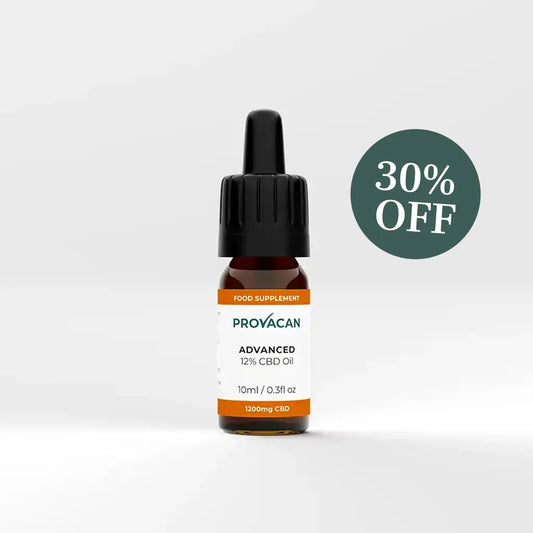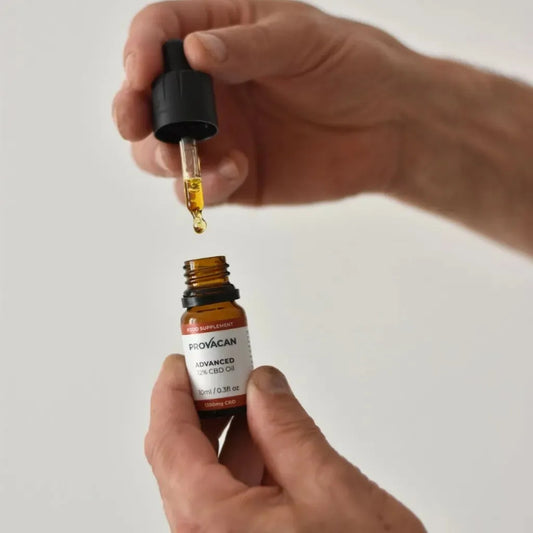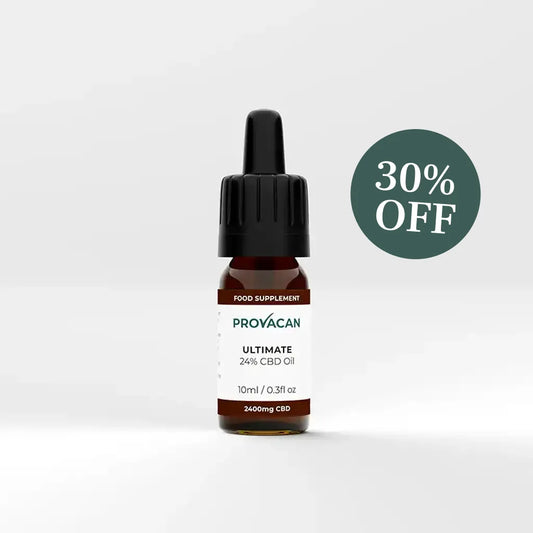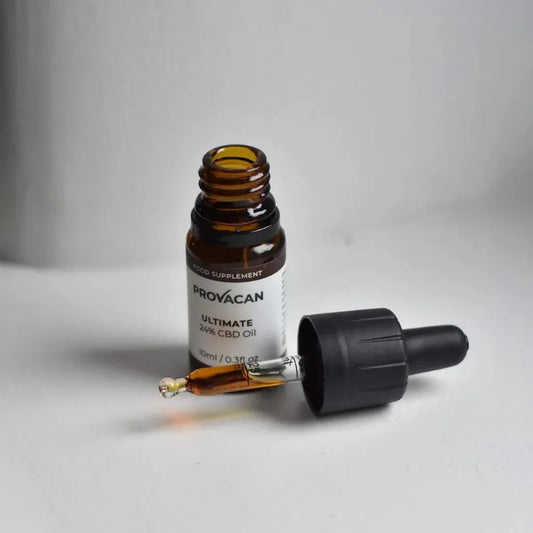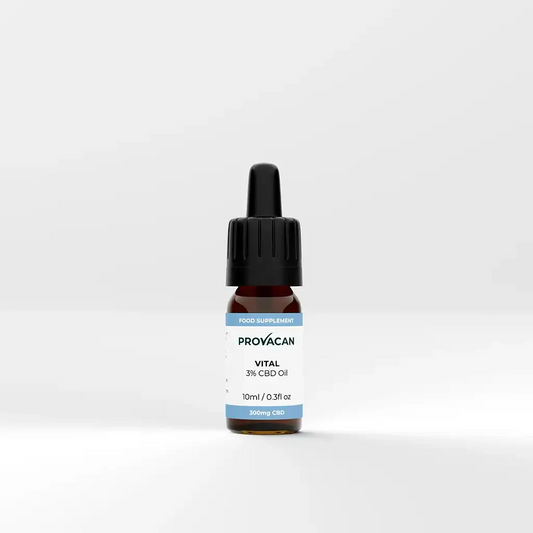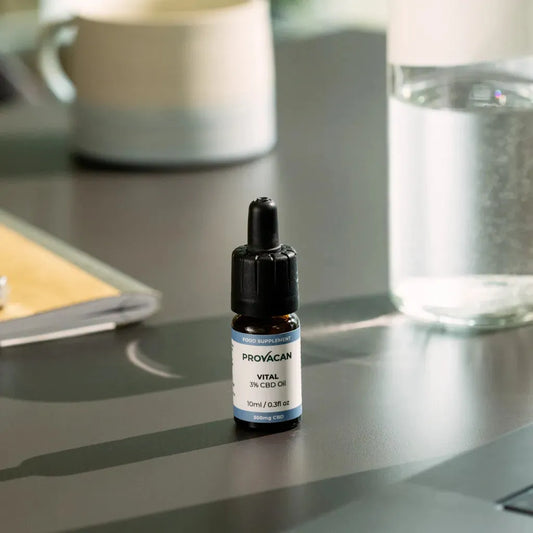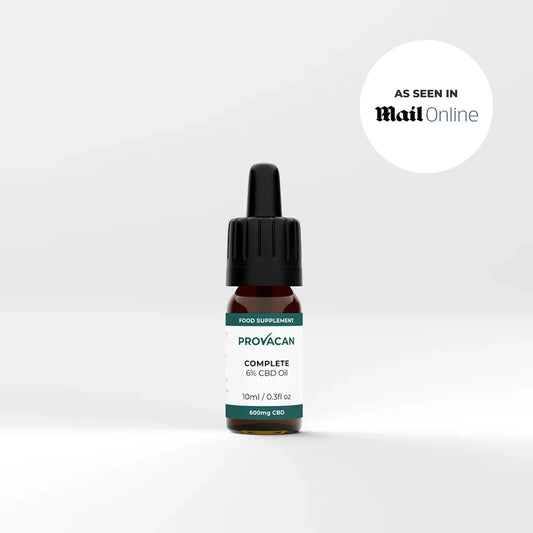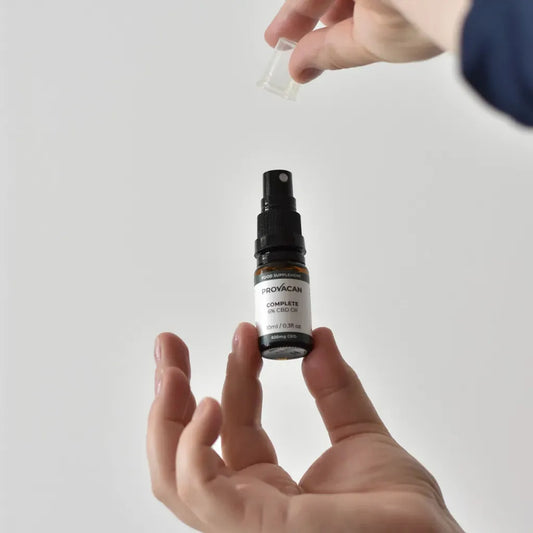Key Takeaways:
- CBD Potency: The potency of CBD oil, often measured in milligrams (mg), is crucial for determining its efficacy and individual suitability.
- Differences In CBD Types: Understanding the differences between full-spectrum, broad-spectrum, and isolate CBD products is essential for making informed wellness choices.
- Provacan's CBD Products: Provacan's commitment to quality involves rigorous testing and precise extraction methods, ensuring supreme purity and effectiveness in every product.
It’s a critical factor.
CBD oil strength influences both the efficacy and the experience of using CBD. The right strength for a user depends on several factors, including the reasons for using CBD, body weight, metabolism, and tolerance levels.
In this article, we’ll explore what CBD oil strength means, the science behind it, the potential benefits of CBD, and how to select the right strength for your needs.
The Basics of CBD Potency
The potency of CBD, often referred to as the strength, indicates the amount of CBD present in a product and is a key determinant of its effectiveness for your wellness needs. CBD oil strength is typically measured in milligrams (mg) and can vary significantly from one product to another.
Understanding the strength of CBD oil is important for several reasons:
- Dosage Control: The oil's strength determines how much CBD is delivered per drop or serving, which is vital for achieving the desired effects.
- Cost Efficiency: Higher-strength oils may offer better value for money, as a smaller amount of oil is needed to achieve the same effects as a larger amount of a lower-strength oil.
- Customisation: Different strengths allow users to tailor their CBD intake to their needs and preferences.
When looking at measurements, a 10ml bottle of CBD oil with 1000mg of CBD is far more potent than a 30ml bottle containing the same amount of CBD. To determine the best strength for your needs, it’s essential to consider your wellness goals and any advice from healthcare professionals. A low to moderate CBD concentration can be a good starting point, with the option to adjust based on your experiences and needs.
Measuring CBD Content: What Do the Numbers Mean?
If you're new to CBD, starting with a product with a lower concentration (e.g., 300mg in 10ml) allows you to gradually explore its effects. For more experienced users or those with specific wellness goals, higher concentrations (e.g., 1500mg io 10ml) may offer more significant benefits, allowing for lower dosages but with stronger effects.
Full-Spectrum vs Broad-Spectrum vs Isolate: What's the Difference?
Here’s a breakdown of what each term means and their implications for your wellness journey.
Full-Spectrum CBD
Full-spectrum CBD oil contains all the compounds naturally found in the cannabis plant. This includes a wide range of cannabinoids beyond CBD, such as CBN (cannabinol), CBG (cannabigerol), and trace amounts of THC (tetrahydrocannabinol). It also includes terpenes, the compounds that give plants their unique smells and flavours and potential health benefits.
The presence of these various compounds means full-spectrum CBD products can produce what's known as the "entourage effect." This theory suggests that CBD works better when it's taken in conjunction with all the other natural compounds found in cannabis, as they work synergistically to enhance the oil's therapeutic effects. For those seeking the most holistic approach to CBD consumption, full-spectrum CBD may be the best choice.
Broad-Spectrum CBD
Broad-spectrum CBD strikes a balance between full-spectrum CBD and CBD isolate. Like full-spectrum, broad-spectrum oil contains most of the natural cannabinoids, terpenes, and other compounds found in the hemp plant. However, Broad-spectrum products undergo a process to remove all traces of THC, making them ideal for individuals concerned about consuming THC for personal, dietary, or occupational reasons. By retaining the other cannabinoids and terpenes, broad-spectrum CBD still allows users to experience the entourage effect, albeit without the psychoactive effects of THC.
CBD Isolate
CBD isolate is the purest form of CBD, containing 99% pure CBD. During the extraction process, all other cannabinoids, terpenes, and hemp plant compounds are entirely removed. This leaves a crystalline powder or solid form that's free of THC, other cannabinoids, and plant materials, making it an excellent choice for those who need to avoid THC entirely.
Provacan's Range of CBD Products
Provacan is a leading brand in the UK CBD market, known for its commitment to quality and transparency. We offer a broad range of CBD oils of various strengths to cater to different needs and preferences.
Provacan CBD Oils
Provacan’s CBD oils are available at the following strengths:
- 300mg Vital CBD Oil: This lower-strength oil is ideal for beginners or those who prefer a milder effect. It provides a gentle introduction to CBD and can be easily incorporated into a daily wellness routine.
- 600mg Complete CBD Oil: A medium-strength option that balances potency and versatility. This oil is suitable for those who have some experience with CBD and are looking for a moderate effect.
- 1200mg Advanced CBD Oil: This higher-strength oil is ideal for more experienced users or those with specific needs, such as managing chronic pain or severe anxiety. It provides a more potent dose of CBD.
- 2400mg Ultimate CBD Oil: Provacan’s highest-strength oil is designed for those who require a strong and concentrated dose of CBD. This oil is often used by individuals with high tolerance levels or those managing more severe conditions.
Final Thoughts
The strength of CBD oil directly influences its effectiveness and suitability for different health objectives and conditions. It's important to remember that higher strength does not necessarily mean better results for everyone. Individual needs and tolerance levels play a significant role in determining the most beneficial concentration.
At Provacan, we’re committed to your wellbeing. We offer several different CBD oil strengths to suit diverse needs and preferences. Our meticulous attention to extraction processes and adherence to the highest purity and potency standards ensure that every drop of Provacan CBD oil delivers the effectiveness our customers expect. Leveraging the latest scientific research, we are devoted to providing you with CBD products that meet stringent quality benchmarks.
Read also:
Frequently Asked Questions on CBD Oil Strength
What is CBD oil?
CBD oil is a natural product derived from the Cannabis sativa plant, specifically from its hemp variety. It contains cannabidiol (CBD), a compound known for its potential wellness benefits without the psychoactive effects associated with marijuana. CBD oil is used for its potential to support overall well-being, offering a natural alternative to traditional health and wellness products.
How is CBD oil strength measured?
CBD oil strength is typically measured in milligrams (mg) of CBD content per unit volume, usually in millilitres (ml). This measurement indicates the potency of the CBD oil, allowing consumers to understand the concentration of CBD in the product they are considering.
What do the numbers on CBD oil labels mean?
The numbers on CBD oil labels represent the concentration of CBD within the product. For example, a label reading "500mg/10ml" means the bottle contains 500 milligrams of CBD in total, distributed throughout 10 millilitres of oil, reflecting the product's potency.
How do you determine the right CBD oil strength for you?
Determining the right CBD oil strength depends on several factors, including your individual wellness goals, body weight, and tolerance to CBD. It’s generally recommended that you start with a low dosage and gradually increase it while monitoring your body's response to find the right balance for your needs.
What does mg per ml mean in CBD oil?
"Mg per ml" refers to the milligrams of CBD per millilitre of the oil, measuring the oil's concentration. This metric is crucial for dosing, as it helps consumers understand how much CBD they consume with each dose.
Why are carrier oils used in CBD oil?
Carrier oils, such as coconut oil or hemp seed oil, are used in CBD oil to enhance the absorption and delivery of CBD into the body. These oils can improve the bioavailability and effectiveness of CBD, making it easier for the body to process.
How can the strength of CBD oil affect your body?
The strength of CBD oil can influence its effects on your body. Higher concentrations may provide more pronounced benefits, but they can also increase the risk of experiencing mild side effects. It's essential to choose a strength that aligns with your body's needs and tolerance.
Is higher-strength CBD oil always better?
Higher-strength CBD oil is not necessarily better for everyone. The optimal strength varies depending on individual health goals, body weight, and tolerance to CBD. Some may find that lower strengths effectively meet their needs, highlighting the importance of personalised consideration.
What is the usual dosage range for CBD oil?
The usual dosage range for CBD oil varies widely among individuals, typically ranging from 5mg to over 100mg per day, depending on the user's needs, the condition being addressed, and the oil's potency. Starting with a low dose and gradually adjusting is advisable to identify what works best for you.
Sources:
- García-Gutiérrez, M. S., Navarrete, F., Molas, M., Sala, F., & Manzanares, J. (2020). Cannabidiol: A Potential New Alternative for the Treatment of Anxiety, Depression, and Psychotic Disorders. Biomolecules, 10(11), 1575. https://doi.org/10.3390/biom10111575
- Fernández-Ruiz, J., Sagredo, O., Pazos, M. R., García, C., Pertwee, R., Mechoulam, R., & Martínez-Orgado, J. (2013). Cannabidiol for neurodegenerative disorders: important new clinical applications for this phytocannabinoid? British Journal of Clinical Pharmacology, 75(2), 323–333. https://doi.org/10.1111/j.1365-2125.2012.04341.x
- Pertwee, R. G. (2008). The diverse CB1 and CB2 receptor pharmacology of three plant cannabinoids: Δ9-tetrahydrocannabinol, cannabidiol, and Δ9-tetrahydrocannabivarin. British Journal of Pharmacology, 153(2), 199–215. https://doi.org/10.1038/sj.bjp.0707442
- Pisanti, S., Malfitano, A. M., Ciaglia, E., Lamberti, A., Ranieri, R., Cuomo, G., Abate, M., Faggiana, G., Proto, M. C., Fiore, D., Laezza, C., & Bifulco, M. (2017). Cannabidiol: State of the art and new challenges for therapeutic applications. Pharmacology & Therapeutics, 175, 133–150. https://doi.org/10.1016/j.pharmthera.2017.02.041




